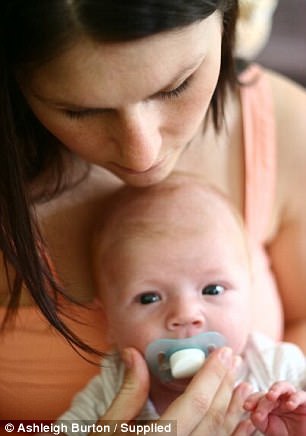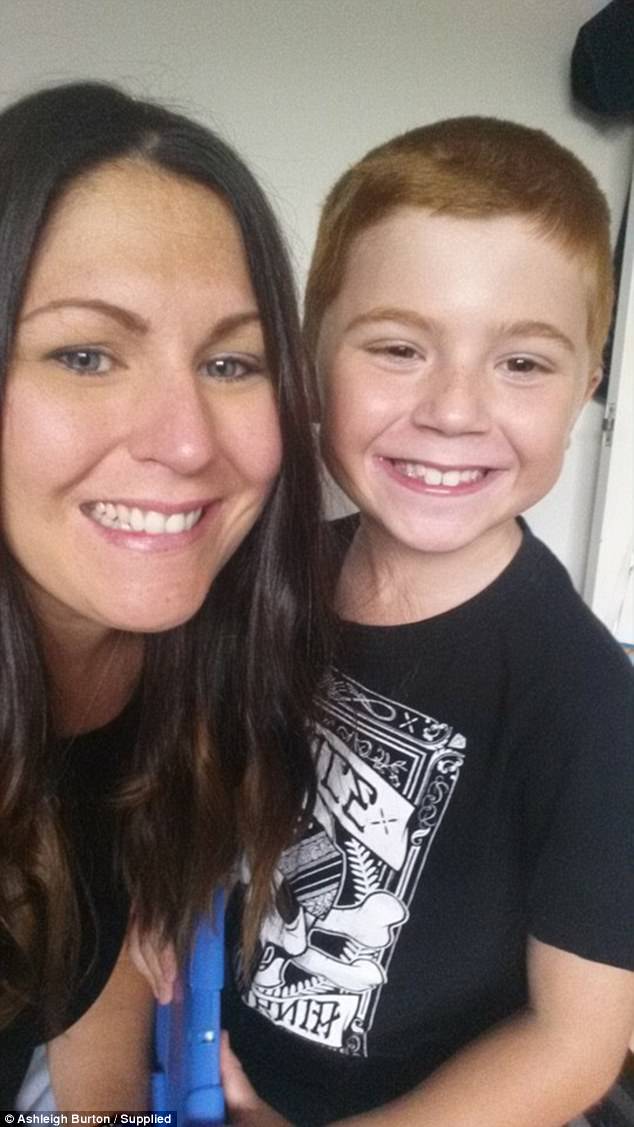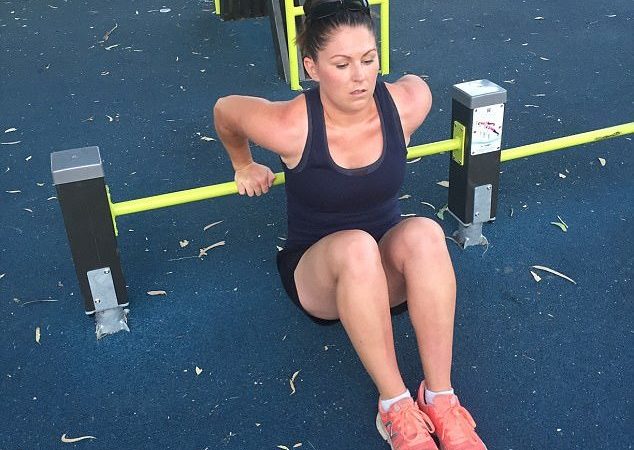Client: Naomi Ferstera, Exercise Physiologist
Mother, 30, who suffered severe post-natal depression that left her vomiting and uncontrollably shaking says HIIT training was the key to her recovery – and she hasn’t relapsed for TWO years
- Ashleigh Burton was hit with PND symptoms 10 months after giving birth to son
- She had been distracted by planning her wedding, and felt it a week before
- Ashleigh was overcome with physical symptoms – vomiting, crying, and shaking
- One day she thought about harming her son, and was finally diagnosed correctly
- Ashleigh hasn’t suffered a relapse since starting HIIT training classes in 2015

It should’ve been the happiest time of Ashleigh Burton’s life. She was a new mum and a new wife, on a Gold Coast honeymoon with the love of her life.
But Ashleigh had never been so miserable, suddenly overcome by uncontrollable shakes and non-stop vomiting. The tears were endless.
As the months crept on Ashleigh sank deeper into what she later found out was post-natal depression – until the moment she even thought of harming her own son’s life.
That day finally helped Ashleigh get a proper diagnosis and treatment. And it was the discovery of HIIT training two years ago that has helped halt her relapses entirely.
It was a week before Ashleigh’s wedding to her now-husband Tom that the symptoms of PND started to creep in.
The new mum had given birth to their son Noah 10 months before, and had been completely distracted with juggling planning a wedding and caring for a newborn.
‘The symptoms didn’t start until I basically stopped,’ she told Daily Mail Australia. ‘[The wedding] was very much preoccupying my brain.’
But at first Ashleigh, now 30, thought it was a virus or wedding day jitters because the symptoms were so physical.
‘I started to feel violently ill, I was shaking uncontrollably and I lost a lot of weight,’ she said.
‘During the wedding I asked my cousin if she was this nervous on her wedding day and she said “No, not as nervous as you are”. The anxiety had kicked into overdrive.’

‘I could barely walk down the aisle, I was shaking so much.’
Ashleigh and Tom had to leave their honeymoon early and return home to Ipswich because her symptoms were so severe.
The first doctor Ashleigh saw diagnosed her with a urinary tract infection, and the second doctor was sure she just had a stomach virus.
‘He said I wasn’t suffering from any signs of depression,’ Ashleigh recalled.
But that only confused Ashleigh more as she continued to feel emotionally disconnected from her husband and son.
‘I didn’t want to be around him, didn’t want to be around Noah,’ she said. ‘The only way I could make everything stop was by trying to go to sleep, and even that was a struggle.’
Ashleigh was having suicidal thoughts and crying ‘all the time for no reason whatsoever’.
‘I knew something was wrong, because I was such a bright, happy person, and then all of a sudden I’m having these wild irrational thoughts of dumping my son and running a million miles away and never looking back,’ she said.
The dark thoughts came to a head one day when she was home alone with Noah and actually imagined hurting him.
‘I was having a bit of a meltdown, crying because he was just crying incessantly and I didn’t know what to do,’ Ashleigh recalled.
‘All of a sudden these thoughts came into my head that I could end it all by harming him and then taking my own life.’
‘My heart just started to race to the point where I thought it was going to explode and I locked myself in the bathroom and began vomiting.’
‘I then rang my husband, screaming down the phone to get home now, that something wasn’t right.’
Family members arrived and stayed with Ashleigh and Noah until Tom could get home.
It was after this incident that Ashleigh was finally diagnosed with post-natal depression, and finally able to get proper treatment.
Ashleigh got on antidepressants and began counselling, but still suffered relapses for years that could be triggered by something as small as a smell or a sound.
But at the beginning of 2016, a friend recommended that Ashleigh come with her to HIIT training classes.
‘She said it might be good for me,’ Ashleigh recalled. ‘My husband was away with work, I just lost my job and had a few family issues going on.’
‘I was on my own and going through a really hard time. She said this might be the escape I was looking for.’
And it was, giving Ashleigh the chance to get out in the community and find a network of caring women who knew she was suffering and still supported her.
That included physiologist Naomi Ferstera, who Ashleigh said took the time to sit down and talk to her about what she was going through and then incorporate it into her training.
It was through Naomi’s classes that Ashleigh was able to learn lessons that helped her cope with her depression and anxiety.
‘When she trains you, she brings out the emotional state in you where you know you can push yourself further than you expected,’ Ashleigh said.
‘For half an hour she goes “You can do this, you can do this, I believe in you” and she’s so positive about her clients and what they’re going through. When she says “I believe in you”, that’s everything.’
Trianing with Naomi (pictured together) taught that Ashleigh lessons that helped her cope with her depression and anxiety
Now when Ashleigh feels those thoughts creeping in, she will fight through them by organising meal plans, going for a walk, or just getting some fresh air.
‘I was able to figure out that half an hour worth of pain, seeing the light at the end of the tunnel, I could use that for my depression. I know what I need to do now.’
It was a surprising change in Ashleigh, who had not been active in fitness since doing sports as a child.
But the more Ashleigh went to her HIIT classes, the more it became her ‘happy place’ as she became closer with the women she worked out with and got stronger in class.
‘I noticed that the more I trained, the more I could things I didn’t know I could do,’ she said. ‘I knew if I could get through that, I could get through anything.’
‘If I knew I was going to class, that changed everything.’
That included her relationships with her husband and Noah, now nine, who noticed how much her mood had changed.
‘I was a lot happier, I was more alive,’ she said. ‘I was a better wife to Tom, a better mum to Noah, because I had my happy place to go to.’
Ashleigh still goes to HIIT training three times a week, and is now sharing her story in hopes it will inspire other women who are struggling with PND.
‘I would tell them they’re not alone,’ she said. ‘It’s more common than they think and they definitely need to talk about it, they need that help to break the cycle they’re in.’
‘Whether they’re mums with one child or six, they need to be able to get out and do stuff for themselves.’


